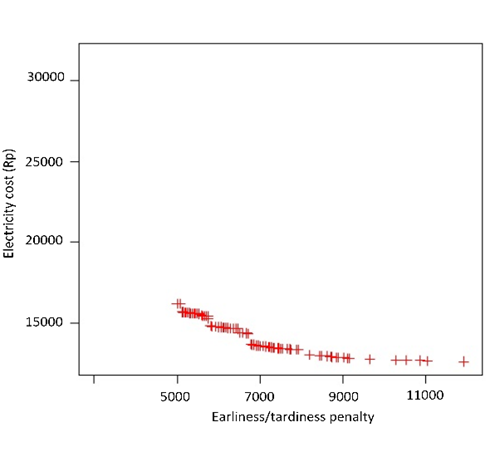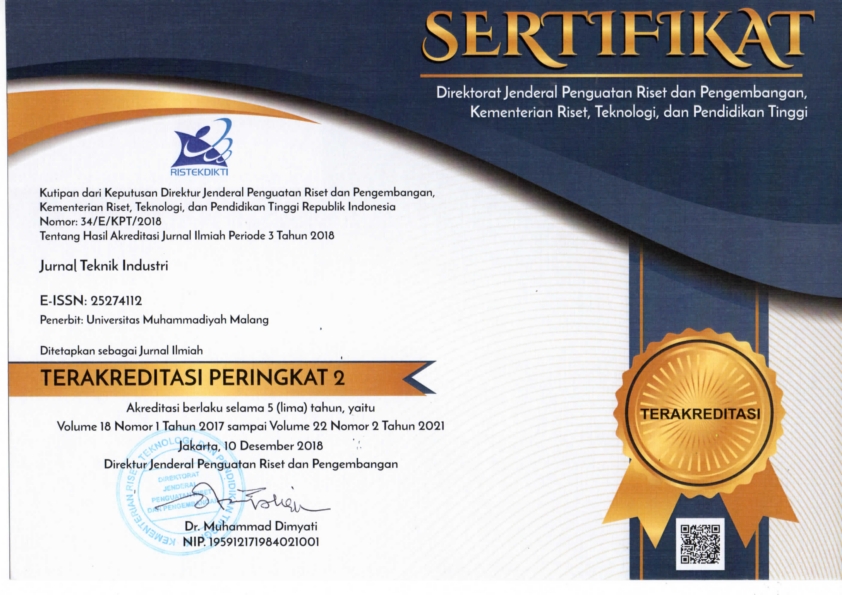Solving Just-in-Time Single Machine Scheduling with Variable Discrete Speed Machine using Hybrid NSGA-II
DOI:
https://doi.org/10.22219/JTIUMM.Vol22.No2.211-223Keywords:
Just-in-time scheduling, Single machine, Variable speed, Multi-objectiveAbstract
Due to industrialization and population growth, increasing energy demand can lead to energy scarcity because non-renewable resources are primarily used as energy sources. In addition, carbon dioxide gas, the waste of industrialization, can harm the environment. Therefore, environmentally friendly methods are encouraged in the industrial environment as energy preservation and climate change mitigation. This research discusses just-in-time single machine scheduling that takes into account energy consumption. In this research, energy consumption depends on the machine’s speed. The objectives are minimizing the just-in-time (JIT) penalty (the sum of weighted earliness/tardiness) and energy consumption. This research proposed a hybrid NSGA-II with a local search to solve the multi-objective scheduling problem. Thus, solving the JIT single-machine scheduling problem considers energy consumption to conserve energy and increase production efficiency. Numerical experiments demonstrated that the hybrid NSGA-II with local search is more effective than the standard NSGA-II in solving the problem. Therefore, decision-makers can use the scheduling model to select alternative solutions that consider energy and the environment without sacrificing efficiency.
Downloads
References
U. E. I. Administration, "International Energy Outlook 2019 with projections to 2050," ed: US EIA Washington, DC, 2019.
M. Götz et al., "Renewable Power-to-Gas: A technological and economic review," Renewable Energy, vol. 85, pp. 1371-1390, 2016. https://doi.org/10.1016/j.renene.2015.07.066.
P. Cappers, C. Goldman, and D. Kathan, "Demand response in U.S. electricity markets: Empirical evidence," Energy, vol. 35, no. 4, pp. 1526-1535, 2010. https://doi.org/10.1016/j.energy.2009.06.029.
K. Fang, N. A. Uhan, F. Zhao, and J. W. Sutherland, "Scheduling on a single machine under time-of-use electricity tariffs," Annals of Operations Research, vol. 238, no. 1, pp. 199-227, 2016. http://doi.org/10.1007/s10479-015-2003-5.
C. Gahm, F. Denz, M. Dirr, and A. Tuma, "Energy-efficient scheduling in manufacturing companies: A review and research framework," European Journal of Operational Research, vol. 248, no. 3, pp. 744-757, 2016. https://doi.org/10.1016/j.ejor.2015.07.017.
M. Akbar and T. Irohara, "Scheduling for sustainable manufacturing: A review," Journal of Cleaner Production, vol. 205, pp. 866-883, 2018. https://doi.org/10.1016/j.jclepro.2018.09.100.
A. N. Sholichah, Y. Yuniaristanto, and I. W. J. J. T. I. Suletra, "Location Routing Problem with Consideration of CO2 Emissions Cost: A Case Study," vol. 21, no. 2, pp. 225-234, 2020. https://doi.org/10.22219/JTIUMM.Vol21.No2.225-234.
A. Dityarini, E. Pujiyanto, and I. W. J. J. T. I. Suletra, "Multi-Objective Optimization Model of Multi-Pass Turning Operations to Minimize Energy, Carbon Emissions, and Production Costs," vol. 21, no. 2, pp. 213-224, 2020. https://doi.org/10.22219/JTIUMM.Vol21.No2.213-224.
A. N. A. A. K. Jabari and A. J. J. T. I. Hasan, "Energy-Aware Scheduling in Hybrid Flow Shop using Firefly Algorithm," vol. 22, no. 1, pp. 18-30, 2021. https://doi.org/10.22219/JTIUMM.Vol22.No1.18-30.
L. Meng, C. Zhang, X. Shao, Y. Ren, and C. Ren, "Mathematical modelling and optimisation of energy-conscious hybrid flow shop scheduling problem with unrelated parallel machines," International Journal of Production Research, vol. 57, no. 4, pp. 1119-1145, 2019. https://doi.org/10.1080/00207543.2018.1501166.
X. Meng, "Lean management in the context of construction supply chains," International Journal of Production Research, vol. 57, no. 11, pp. 3784-3798, 2019. https://doi.org/10.1080/00207543.2019.1566659.
B. J. J. T. I. Kurniawan, "Mathematical Models of Energy-Conscious Bi-Objective Unrelated Parallel Machine Scheduling," vol. 21, no. 2, pp. 115-125, 2020. https://doi.org/10.22219/JTIUMM.Vol21.No2.115-125.
I. Módos, P. Šůcha, and Z. Hanzálek, "Algorithms for robust production scheduling with energy consumption limits," Computers & Industrial Engineering, vol. 112, pp. 391-408, 2017. https://doi.org/10.1016/j.cie.2017.08.011.
S. Wang, X. Wang, J. Yu, S. Ma, and M. Liu, "Bi-objective identical parallel machine scheduling to minimize total energy consumption and makespan," Journal of Cleaner Production, vol. 193, pp. 424-440, 2018. https://doi.org/10.1016/j.jclepro.2018.05.056.
D. M. J. J. T. I. Utama, "An effective hybrid sine cosine algorithm to minimize carbon emission on flow-shop scheduling sequence dependent setup," vol. 20, no. 1, pp. 62-72, 2019. http://eprints.umm.ac.id/id/eprint/62683.
S. Chetty and A. O. Adewumi, "A Study on the Enhanced Best Performance Algorithm for the Just-in-Time Scheduling Problem," Discrete Dynamics in Nature and Society, vol. 2015, p. 350308, 2015. http://doi.org/10.1155/2015/350308.
J. Zeng, C. A. Phan, and Y. Matsui, "Supply chain quality management practices and performance: An empirical study," Operations Management Research, vol. 6, no. 1, pp. 19-31, 2013. http://doi.org/10.1007/s12063-012-0074-x.
X. Liu, F. Chu, F. Zheng, C. Chu, and M. Liu, "Parallel machine scheduling with stochastic release times and processing times," International Journal of Production Research, pp. 1-20, 2020. http://doi.org/10.1080/00207543.2020.1812752.
M. M. Aghelinejad, Y. Ouazene, and A. Yalaoui, "Single-machine scheduling problem with total energy consumption costs minimization ⁎⁎This research is supported by the Champagne-Ardenne region in France and FEDER (Fonds europen de dveloppement conomique et rgional)," IFAC-PapersOnLine, vol. 52, no. 13, pp. 409-414, 2019. https://doi.org/10.1016/j.ifacol.2019.11.087.
M. Aghelinejad, Y. Ouazene, and A. Yalaoui, "Complexity analysis of energy-efficient single machine scheduling problems," Operations Research Perspectives, vol. 6, p. 100105, 2019. https://doi.org/10.1016/j.orp.2019.100105.
A. Ahmadi-Javid, P. Seyedi, and S. S. Syam, "A survey of healthcare facility location," Computers & Operations Research, vol. 79, pp. 223-263, 2017. https://doi.org/10.1016/j.cor.2016.05.018.
G. A. Idowu, M. O. Adamu, and B. S. Sawyerr, "Hybrid Metaheuristic for Just In Time Scheduling in a Flow Shop with Distinct Time Windows," International Journal of Mathematical Sciences Optimization: Theory Applications, vol. 2020, no. 1, pp. 741-756, 2020. http://ijmso.unilag.edu.ng/article/view/1038.
Y. Hendel, N. Runge, and F. Sourd, "The one-machine just-in-time scheduling problem with preemption," Discrete Optimization, vol. 6, no. 1, pp. 10-22, 2009. https://doi.org/10.1016/j.disopt.2008.08.001.
B. Ogun, Ç. J. J. o. I. E. Alabas-Uslu, and Management, "Mathematical models for a batch scheduling problem to minimize earliness and tardiness," vol. 11, no. 3, pp. 390-405, 2018. http://doi.org/10.3926/jiem.2541.
F. Xiong, M. Chu, Z. Li, Y. Du, and L. Wang, "Just-in-time scheduling for a distributed concrete precast flow shop system," Computers & Operations Research, vol. 129, p. 105204, 2021. https://doi.org/10.1016/j.cor.2020.105204.
E. B. Tirkolaee, A. Goli, and G. W. Weber, "Fuzzy Mathematical Programming and Self-Adaptive Artificial Fish Swarm Algorithm for Just-in-Time Energy-Aware Flow Shop Scheduling Problem With Outsourcing Option," IEEE Transactions on Fuzzy Systems, vol. 28, no. 11, pp. 2772-2783, 2020. http://doi.org/10.1109/TFUZZ.2020.2998174.
M. Abedi, H. J. I. J. o. S. Seidgar, and O. Management, "A new bi-level meta-heuristic approach for a single machine JIT-scheduling in the batch delivery system with controllable due dates," vol. 23, no. 2, pp. 135-152, 2016. https://doi.org/10.1504/IJSOM.2016.074052.
O. A. Arık, "Single machine earliness/tardiness scheduling problem with grey processing times and the grey common due date," Grey Systems: Theory and Application, vol. 11, no. 1, pp. 95-109, 2021. https://doi.org/10.1108/GS-01-2020-0010.
N. M. P. Bocken, P. Rana, and S. W. Short, "Value mapping for sustainable business thinking," Journal of Industrial and Production Engineering, vol. 32, no. 1, pp. 67-81, 2015. http://doi.org/10.1080/21681015.2014.1000399.
G. A. Rolim and M. S. Nagano, "Structural properties and algorithms for earliness and tardiness scheduling against common due dates and windows: A review," Computers & Industrial Engineering, vol. 149, p. 106803, 2020. https://doi.org/10.1016/j.cie.2020.106803.
R. Benmansour, H. Allaoui, A. Artiba, and S. Hanafi, "Minimizing the weighted sum of maximum earliness and maximum tardiness costs on a single machine with periodic preventive maintenance," Computers & Operations Research, vol. 47, pp. 106-113, 2014. https://doi.org/10.1016/j.cor.2014.02.004.
M. Shahriari, N. Shoja, A. E. Zade, S. Barak, and M. Sharifi, "JIT single machine scheduling problem with periodic preventive maintenance," Journal of Industrial Engineering International, vol. 12, no. 3, pp. 299-310, 2016. http://doi.org/10.1007/s40092-016-0147-9.
H. Zhang, F. Wu, and Z. Yang, "Hybrid approach for a single-batch-processing machine scheduling problem with a just-in-time objective and consideration of non-identical due dates of jobs," Computers & Operations Research, vol. 128, p. 105194, 2021. https://doi.org/10.1016/j.cor.2020.105194.
T. Keshavarz, "A lower bounding method for earliness and tardiness minimization on a single batch processing machine," (in en), Journal of Industrial and Systems Engineering, vol. 13, no. Issue 2, pp. 9-26, 2020. http://www.jise.ir/article_113037.html.
C. Low, R.-K. Li, and G.-H. Wu, "Minimizing Total Earliness and Tardiness for Common Due Date Single-Machine Scheduling with an Unavailability Interval," Mathematical Problems in Engineering, vol. 2016, p. 6124734, 2016. http://doi.org/10.1155/2016/6124734.
J. B. J. O. R. Sidney, "Optimal single-machine scheduling with earliness and tardiness penalties," vol. 25, no. 1, pp. 62-69, 1977. https://doi.org/10.1287/opre.25.1.62.
K. Deb, A. Pratap, S. Agarwal, and T. Meyarivan, "A fast and elitist multi-objective genetic algorithm: NSGA-II," IEEE Transactions on Evolutionary Computation, vol. 6, no. 2, pp. 182-197, 2002. http://doi.org/10.1109/4235.996017.

Downloads
Published
How to Cite
Issue
Section
License
Copyright (c) 2021 Bobby Kurniawan, Ade Irman, Evi Febianti, Kulsum, Lely Herlina, Muhammad Adha Ilhami, Yusraini Muharni, Fellek Getu Tadesse

This work is licensed under a Creative Commons Attribution-ShareAlike 4.0 International License.











